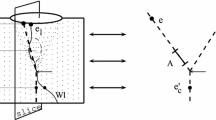Abstract
“Branching space-times” (BST) is intended as a representation of objective, event-based indeterminism. As such, BST exhibits both a spatio-temporal aspect and an indeterministic “modal” aspect of alternative possible historical courses of events. An essential feature of BST is that it can also represent spatial or space-like relationships as part of its (more or less) relativistic theory of spatio-temporal relations; this ability is essential for the representation of local (in contrast with “global”) indeterminism. This essay indicates how BST might be seen to grow out of Newton’s deterministic and non-relativistic theory by two independent moves: (1) Taking account of indeterminism, and (2) attending to spatio-temporal relationships in a spirit derived from Einstein’s theory of special relativity. Since (1) and (2) are independent, one can see that there is room for four theories: Newtonian determinism, branching time indeterminism, relativistic determinism, and (finally) branching space-times indeterminism.
Similar content being viewed by others
References
Belnap, N. (1992). Branching space-time. Synthese, 92, 385–434. A postprint containing a number of additional explanations and a little restructuring is archived at http://philsci-archive.pitt.edu.
Belnap N. (2002a) Double time references: Speech-act reports as modalities in an indeterminist setting. In: Wolter F., Wansing H., de Rijke M., Zakharyaschev M. (eds) Advances in modal logic, (Vol. 3, pp. 37–58). World Scientific, Singapore
Belnap N. (2002b) EPR-like “funny business” in the theory of branching space-times. In: Placek T., Butterfield J. (eds) Non-locality and Modality. Kluwer, Dordrecht, pp 293–315
Belnap, N. (2003). No-common-cause EPR-like funny business in branching space-times. Philosophical studies, 114, 199–221. A preprint may be obtained from http://philsci-archive.pitt.edu.
Belnap N. (2005a) Agents and agency in branching space-times. In: Vanderveken D. (eds) Logic, thought and action. Springer, Dordrecht, pp 291–313
Belnap, N. (2005b). A theory of causation: Causae causantes (originating causes) as inus conditions in branching space-times. British journal for the philosophy of science, 56, 221–253. A preprint of this essay may be obtained from http://philsci-archive.pitt.edu.
Belnap N. (2007a) In: Müller T., Newen A. (eds) Logik, Begriffe, Prinzipien des Handeln (Logic, concepts, principles of action). Mentis Verlag, Paderborn, pp 13–31
Belnap, N. (2007b). Probabilities and propensities. Studies in the history and philosophy of modern physics, 38, 593–625. doi:10.1016/j.hpdb.2006.09.003. This essay contains a number of calculational errors. See Belnap 2010 for a corrected version.
Belnap, N. (2010). Probabilities and propensities (revised). This postprint may be obtained as number 144x from www.pitt.edu/~belnap.
Belnap N., Perloff M., Xu M. (2001) Facing the future: Agents and choices in our indeterminist World. Oxford University Press, Oxford
Einstein, A., Lorentz, H. A., Weyl, H., & Minkowski, H. (1924). The principle of relativity. New York: Dover Publications Inc. A collection.
Horty J. F. (2001) Agency and deontic logic. Oxford University Press, Oxford
James, W. (1884). The dilemma of determinism. In The will to believe. New York: Dover.
Laplace, P. S. (1812–1820). Theorie analytique de probabilitiés: Introduction, VII, Oeuvres. Translation of passage taken from The Columbia world of quotations. New York: Columbia University Press (1996)
Lewis D. (1986) On the plurality of worlds. Basil Blackwell, Oxford and New York
Mackie J. L. (1974) The cement of the universe. Oxford University Press, Oxford
Müller T. (2002) Branching space-time, modal logic and the counterfactual conditional. In: Placek T., Biutterfield J. (eds) Modality and non-locality. Kluwer, Dordrecht, pp 273–291
Müller T. (2005) Probability theory and causation: A branching space-times analysis. British journal for the philosophy of science 56: 487–520
Müller T. (2007) Branch dependence in the “consistent histories” approach to quantum mechanics. Foundations of physics 37(2): 253–276
Müller, T. (2009). Eliminating modality from the determinism debate? Models vs. equations of physical theories. In A. Hieke, & H. Leitgeb (Eds.), Reduction, abstraction, analysis. Proceedings of the 31th international Ludwig Wittgenstein symposium in Kirchberg (pp. 47–62). Frankfurt: Ontos Verlag.
Müller T., Belnap N., Kishida K. (2008) Funny business in branching space-times: infinite modal correlations. Synthese 164(1): 141–159
Müller T., Placek T. (2001) Against a minimalist reading of Bell’s theorem: Lessons from Fine. Synthese 128: 343–379
Mundy B. (1986) Optical axiomatization of Minkowski space-time geometry. Philosophy of science 53: 1–30
Øhrstrøm P., Hasle P. (1995) Temporal logic: From ancient ideas to artificial intelligence. Kluwer Academic Publishers, Dordrecht
Placek T. (2000) Is nature deterministic?. Jagiellonian University Press, Kraków
Placek T. (2004) Quantum state holism: A case for holistic causation. Studies in history and philosophy of modern physics 35: 671–692
Placek T. (2010) Possibilities without possible worlds/histories. Journal of Philosophical Logic 40: 1–29
Placek, T., & Belnap, N. (2010). Indeterminism is a modal notion: branching spacetimes, and Earman’s pruning. Synthese, forthcoming.
Placek T., Müller T. (2007) Counterfactuals and historical possibility. Synthese 154: 173–197
Placek T., Wroński L. (2009) On infinite EPR-like correlations. Synthese 167(1): 1–32
Prior A. N. (1967) Past, present, and future. Oxford University Press, Oxford
Stein H. (1991) On relativity theory and openness of the future. Philosophy of science 58: 147–167
Szabo L., Belnap N. (1996) Branching space-time analysis of the GHZ theorem. Foundations of physics 26(8): 989–1002
Thomason R. H. (1970) Indeterminist time and truth-value gaps. Theoria 36: 264–281
Thomson J. J. (1977) Acts and other events. Cornell University Press, Ithaca
Weiner M., Belnap N. (2006) How causal probabilities might fit into our objectively indeterministic world. Synthese 149: 1–36
Xu M. (1997) Causation in branching time (i): transitions, events and causes. Synthese 112: 137–192
Author information
Authors and Affiliations
Corresponding author
Additional information
This is an updated and mildly revised version of Belnap (2007a), with the kind permission of Mentis Verlag.
Rights and permissions
About this article
Cite this article
Belnap, N. Newtonian determinism to branching space-times indeterminism in two moves. Synthese 188, 5–21 (2012). https://doi.org/10.1007/s11229-012-0063-5
Received:
Accepted:
Published:
Issue Date:
DOI: https://doi.org/10.1007/s11229-012-0063-5



